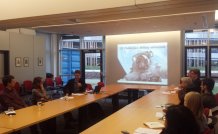
Dr Kubo Mačák (centre) delivering a presentation in the MPIL Agora on 14 December 2017
Exeter academics undertook research fellowships at the Max Planck Institute in Heidelberg
Dr Ana Beduschi and Dr Kubo Mačák spent four months as visiting researchers at the Max Planck Institute for Comparative Public Law and International Law.
The Max Planck Institute for Comparative Public Law and International Law was founded in 1924 and is considered as one of the key research institutes in public international law worldwide. The Institute hosts visiting scholars from around the world, making it a highly cosmopolitan and vibrant environment to pursue one’s own research. It has the most comprehensive library in public international law in Europe. Dr Ana Beduschi and Dr Kubo Mačák, members of the Exeter Centre for International Law (ECIL), spent four months between September and December 2017 as visiting researchers at the Institute.
Dr Beduschi carried out research on the topic of big data in international migration and the possible State obligations it generates under international human rights law. Migrants and refugees are increasingly using mobile phones and digital features available online to prepare for migration and while on the move. Concurrently, advances in computer science allow for progressively more accurate analysis of the data generated by mobile devices and online searches, determining specific behavioural patterns, geolocation and human interactions.
Against the backdrop of the ongoing migration crisis, the protection of migrants’ human rights in the digital era and the potential obligations of States to identify and assist vulnerable migrants are of great relevance. Dr Beduschi’s research investigates the implications of these technological advances for State obligations under international human rights law. It argues that the development of modern technologies can affect States’ capabilities for the identification of individuals in need of protection and that big data can and should be used as a tool for the protection of migrants’ legal rights.
She presented her research findings at the American Society of International Law Midyear Meeting in St Louis, MO, USA, and at the European Society of International Law Annual Conference in Naples, Italy. Dr Beduschi said “as my research draws upon a variety of areas of international law, having the opportunity to discuss it with researchers at the Max Planck Institute was an invaluable opportunity which has certainly enriched my work on the topic.”
Dr Mačák engaged in research into the process and consequences of the internationalisation of armed conflicts from the perspective of international law. In today’s world, very few armed conflicts remain isolated from foreign involvement and confined to the territory of one State. Instead, many begin as internal conflicts that gradually acquire international characteristics of varying degree and nature.
Dr Mačák’s research uncovers the tipping points that convert non-international armed conflicts into international armed conflicts; and it analyses how exactly the existing law of armed conflict applies to conflicts that have undergone this legal conversion. A book-length examination of these issues will be published later this year by OUP as a monograph entitled Internationalised Armed Conflicts in International Law.
In addition, on 14 December 2017, Dr Mačák presented several aspects of his research in the “MPIL Agora” forum at the Institute. The topic of his presentation was ‘Old Wine, New Bottles? Challenges for the Application of the Law of Targeting in Cyberspace and Outer Space’. He argued that the law of armed conflict applies to the domains of cyberspace and outer space. He then analysed one specific challenge arising in each of these domains: the question whether computer data may become a military objective under the law of armed conflict and the question of lawfulness of attacks against military astronauts in time of armed conflict. He concluded by emphasising that accepting that the law applies to specific cyber and space operations does not legitimate or encourage such conduct. Dr Mačák commented: “The atmosphere at the Institute is in equal parts learned, dynamic, and friendly. I am grateful for being able to develop and discuss my research there and I look forward to further opportunities for collaboration between our institutions.”
Date: 31 January 2018
